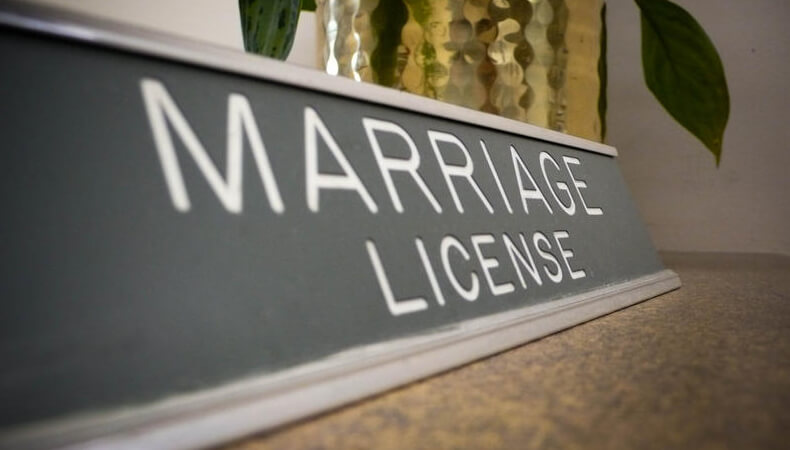If you plan to get wed-locked during this pandemic and want to know how to get a marriage license online, you are on the right platform. Here we are going to talk about the registration of marriage and the legal requirements to process the same.
Here we go…….
Before you plan to apply for your marriage license, you must know that every country has different rules and requirements for obtaining a marriage license. Here in this post, we are sharing a step-by-step procedure to obtain a marriage license online in India.
In India, marriage is governed by the Hindu Marriage Act, 1955 and the Special Marriage Act, 1954. Earlier it was not essential to register your marriage, but today, it is mandatory to register your marriage. It doesn’t matter how big or small your marriage celebration was, as marriage registration is independent of it. A marriage license works as evidence of the marriage. It is a legal approval of your matrimony and is accepted in other countries as well.
Most couples struggle really hard to get a marriage license. Some couples literally approach registration agents to smoothen the procedure and end up having a tough time. Most of the time, these agents are not trustworthy; you end up paying unnecessary money to them. Things are a lot easier now. Today, you don’t need to visit registration offices for your marriage license. You can now apply online as well, from the comfort of your home.
Marriage Acts in India
For marriage registration in India, you can either register under the Hindu Marriage Act, 1955 or under the Special Marriage Act, 1954. The Hindu Marriage Act is an Act of the Parliament of India enacted in 1955 and is relevant to Hindus. While the Special Marriage Act is ad rem to all the residents of India independent of their religion. The Hindu Marriage Act accommodates enlistment of and, as of now, solemnized marriage and does not accommodate solemnization of a marriage by a Marriage Registrar. Nevertheless, the Special Marriage Act accommodates the solemnization of marriage just as enlistment by a Marriage Officer. To be qualified for marriage in India, the minimum age for males is 21 years, and for females, it is 18 years.
Why do you need a Marriage Certificate or Marriage License?
A Marriage License is an official document that establishes the marital status of a couple. It is actually a legal proof of your marriage. Having a marriage license is very significant and useful. A couple needs to present their marriage certificate in myriads of documentation processes like opening a bank account, acquiring a passport, changing one’s last name, etc. Also, it can be supportive in obtaining visas for the spouse or couple. Sometimes government offices in India, just as in other nations, don’t discern conventional marriages; the Marriage Certificate becomes mandatory for the couple to obtaining a companion visa to travel abroad. It also empowers the spouse to have access to their partner’s life insurance policy and bank accounts in case of a death where no nominee has been chosen.
What is the best time to obtain a marriage certificate?
Well, when it comes to obtaining a marriage certificate, there is no time bar for that. You can register your marriage immediately after your wedding ceremony or after two years or ten years of getting married. The procedure remains the same. However, it is good to get it done as soon as you get married. This way, you can avoid any emergency that may occur in the future.
There are two ways you can apply for a marriage certificate, online or offline. In an offline process, you will need to visit the registrar’s office for the entire process. While in an online process, you can simply register yourself online and get things done from the place of your comfort.
Step-by-Step Offline Marriage Registration Process
For offline marriage registration, you will need to enroll yourself at the Sub Divisional Magistrate’s office, under whose locale the marriage took place or where both the people remained for at least six months or more before the wedding.
Appointment: According to the Hindu Marriage Act, you will need to fix an appointment within 15 days of the request. While in the case of the Special Marriage Act, it may take as long as 60 days.
Witness: You will need people as witnesses. Any individual – your friend, or your family member who comes along with you at the marriage registrar office- can witness your marriage. A witness must have a legitimate PAN Card and a Proof of residence.
Documents Required: You will need to submit printed copies of a few documents, which are as follows:
- Duly filled application form
- Printed copies of Proof of Address-Voter ID/Ration Card/Passport, Driving License
- Printed copies of Proof of Date of Birth of the couple
- Two passport-sized photographs
- One marriage photo
- Printed copies of Aadhaar Cards of the couple
- Separate Marriage Affidavits in the endorsed group from Husband and Wife.
- Marriage Invitation Card
All the documents must be self-attested (i.e., signed) by you and your spouse. Also, you will need to take your original documents as well, along with you.
Step-by-Step Online Marriage Registration Process
Another way to register your marriage is by applying for your marriage certificate online. Applying for a marriage certificate online is very easy; it involves a few simple steps, and you are done. Here are the steps:
- Go to the online portal of marriage registration, (https://www.onlinemarriageregistration.com)
- Select your state and district.
- Once you select your district, continue filling in your details.
- Fill in the husband’s details and choose the option “Registration of Marriage Certificate.”
- Fill in the Marriage Certificate form and then choose the Date of appointment.
- Click “Submit Application”
Once your online registration is done, you would receive an acknowledgment slip and a number printed on it. Take a printout of acknowledgment slip along with the application form.
Step to take in case of Inter-caste Marriage Registration.
Special Marriage Act, 1954, is an act that facilitates registration of inter-caste marriages. It is specifically designed for people who wish to marry a person from another caste. If you and your spouse belong to different castes, you will need to register your marriage under the Special Marriage Act, 1954. People belonging to different religions and faiths can have their marriages solemnized under this Act. Besides, marriages performed under other forms can also be registered under this Act. Here are the steps to follow:
Informing about the intended marriage: The first step is to inform the district’s marriage officer about your intention to marry. For this, you will need to fill in the court marriage application form (as mentioned in Schedule II of the Act). You can download the form online as well. The duly filled form has to be submitted 30 days before the marriage date to the district office where either of the participants resides in.
Also Read: Find the Exclusive Tips to Host The Inter-Caste Weddings Smoothly
Displaying the Notice: The district’s marriage registrar will display the notice at a prominent place at his office for 30 days. Within this period, any of the two can object to the marriage if deemed illegal under the Act and the prescribed eligibility conditions. Section 7 of the Special Marriage Act states that any person having an objection to the marriage intended can object within 30 days from the notice’s publication.
Upon receiving any such objection, the marriage registrar checks the validity of the same. On being reasonably satisfied with the objection’s validity, the marriage registrar can end the court marriage process then and therein. In such a situation, the parties can appeal to the concerned district court against the marriage registrar’s order.
If there is no valid objection, the marriage registrar can proceed with the court marriage procedure.
Day of Marriage: On the day of marriage, the bride, groom, along with three witnesses, will need to sign a declaration form in the presence of the marriage registrar. The declaration would state that the couple is proceeding with the marriage under the Special Marriage Act in their consent.
Court marriage certificate: Once all the formalities are done, the marriage registrar will insert the court marriage’s details in the court marriage certificate. It will be as per the provisions mentioned in Schedule IV of the Special Marriage Act.
The certificate of marriage is usually issued within 15 to 30 days.
The entire marriage process under the Special Marriage Act usually takes 30 to 60 days to complete.
You will need to furnish the following documents when applying for a court marriage:
- The prescribed form, duly filled and signed by both the prospective groom and bride
- Receipt of the court marriage fees.
- Two passport-sized photographs each.
- Date of Birth Proof (Voter ID Card/ Pan Card/ Municipal Corporation Certificate/ Pass certificate for 10th or 12th Examination)
- Proof of residential address (PAN Card or Aadhar Card)
- In case either party is a divorcee or a widow, divorce decree/order or death certificate of the spouse will be required, as the case may be.
- Affidavit – the affidavit must contain the following information related to the marriage under the Special Marriage Act – Marital status of the parties, Date of birth of the parties, and a statement confirming that the couple is not related to one another.
- Besides, the witnesses will need to present their Identity proof, Residential address proof, PAN card, and One passport-sized photograph each for the solemnization of the marriage.
Tatkal Marriage Registration
As the name says, tatkal marriage registration is for those who want to get a marriage certificate in a short span. The standard process of getting a marriage certificate is time-consuming, which could be a problem for people planning to settle to another country immediately after their wedding. If yours is the same case, or if you are in a hurry and want to obtain your marriage certificate urgently, you can apply for a tatkal marriage certificate.
The procedure to apply for a tatkal marriage certificate is the same as the general process except for the timeline. In tatkal, you get an appointment from the marriage registrar in 1–2 days, and once your marriage certificate is approved, it is uploaded within 24 hours.
NOTE: Only Hindu, Sikh, Buddhists, and Jain marriages can be registered under the tatkal marriage registration process. Christian, Muslim, and Interreligious marriages cannot be registered under this. Such marriages can only be registered under the special marriage act, which is a 30 days procedure.
What is the fee to register a marriage?
The fee varies from place to place and registration to registration. For instance, if you register under the Hindu Marriage Act, you will need to pay INR 100 for registering it. While in case of marriage under the Special Marriage Act, the civic body charges INR 150 for issuing a marriage certificate. And the fee for tatkal marriage registration is higher, as it is the fastest way to receive the marriage certificate. In the case of
Tatkal Marriage Registration, the revenue department charges INR 10,000 for the marriage certificate.
To Conclude….
So this is how to get a marriage license online and offline as well. Getting a marriage certificate may seem cumbersome to you, but it is now mandatory to have a marriage certificate. Make sure you apply for a marriage certificate after your marriage. Delaying the process is not wise. Moreover, it has become easy to obtain a marriage license now, so there is no point in waiting!
Happy Wedding…. ☺ ☺





![How to Create the Best Digital Wedding Guest Book [2024] How to Create the Best Digital Wedding Guest Book [2024]](https://www.happywedding.app/blog/wp-content/uploads/2024/05/How-to-Create-a-Digital-Wedding-Guest-Book-300x150.jpg)

![150 Best Wedding Wishes to Write in a Card [2024] 150 Best Wedding Wishes to Write in a Card [2024]](https://www.happywedding.app/blog/wp-content/uploads/2024/07/Wedding-Wishes-to-Write-in-a-Card-300x150.jpg)